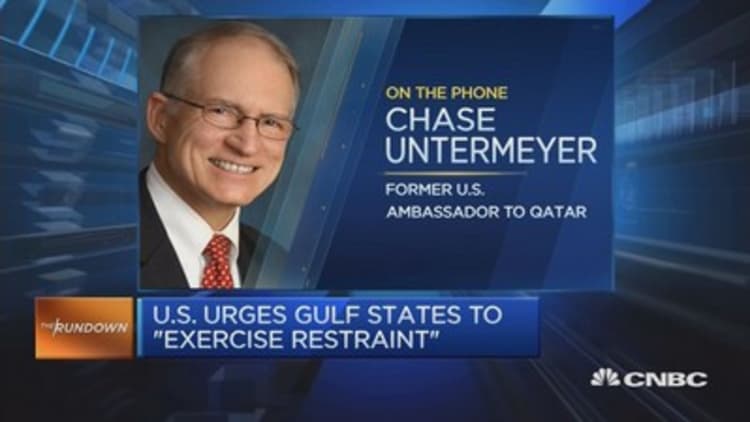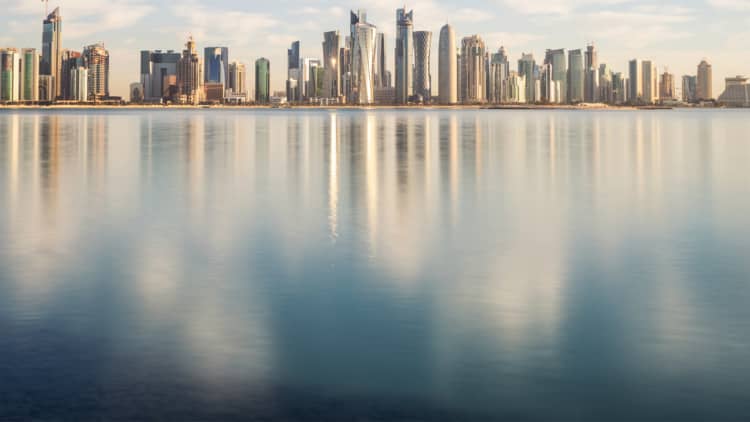
Qatar is likely to reject the bulk of the demands put forward by Saudi Arabia and its allies after a damaging blockade that's left the region in crisis, a former U.S. ambassador to the country said Tuesday.
Chase Untermeyer, who was ambassador to the country from 2004 to 2007, said there are few opportunities for compromise on the list of 13 demands, which include closing a Turkish military base and shutting down Al Jazeera, the state television network.
"Qatar clearly will reject these demands," Untermeyer told CNBC's "The Rundown."
"The only thing I can possibly imagine would be to send away from Qatar representatives of various organizations and groups such as Hamas, that are not only obnoxious on their own sake, but are condemned by the United Nations and by the United States and other Western powers," he added.
"That doesn't really bother Saudi Arabia because Hamas's chief target is Israel, but the fact is that if there were to be any kind of small bit of sacrifice, those kind of relationships can be easily done and not really affect the foreign policy of Qatar."
Qatar, the world's largest liquefied natural gas exporter, has provided an official response to the 13 demands to authorities in Kuwait —which is mediating the dispute between Saudi Arabia, the United Arab Emirates, Bahrain and Egypt. No details of the reply have so far been made public.
What they want
Saudi Arabia and its allies cut ties and transport links with Qatar a month ago, accusing the wealthy country of supporting terrorism. Qatar denied the charge and has stood steadfast, bringing in support from outsiders Iran and Turkey to ride out the storm.
Alongside shutting down a Turkish military base and silencing Al Jazeera, the blockade countries also requested Qatar sever all ties to "terrorist groups," handover "terrorist figures" and align itself with other Gulf and Arab countries.
Qatar is also being asked to curb diplomatic ties Iran, which is a key rival of Saudi Arabia.
"Why should Qatar cut ties with Iran when Saudi Arabia, the United Arab Emirates and others among the blockading countries have their own ties with Iran?" said Untermeyer.
Qatar has said it is willing to discuss the matters, but described the 13 demands as being "made to be rejected."
"Some of these things, they will absolutely not be able to budge on," said Emily Hawthorne, a Middle East and North Africa analyst at geopolitical intelligence firm Stratfor.
"Some of these demands really get at the fundamental components of Qatari foreign policy in ways that Qatar has made a name for itself over the past decade."
The deadline for Qatar to comply with the demands had been due to expire on Sunday, but the blockade countries granted a 48-hour extension in order for Qatar to conform.
"The status quo right now is not an option, but economically, Qatar can outlast some of the economic pressure that some of the blockading countries have put on Doha," Hawthorne added.
Qatar's leverage
With neither side showing any sign of compromising publicly, Hawthorne said the crisis is likely to persist for months to come.
"Qatar is very good at maintaining balanced relationships, and that's what it really wants to hold on to here," she said.
"It can withstand the economic pressure, but it needs to hold on to maintaining balanced relationships with Russia, with the United States, with Iran as well as Saudi Arabia," she added.

The blockading countries, particularly the UAE, have threatened extra economic sanctions on Qatar, which Hawthorne said "would be a logical escalation from this point in the crisis."
"It's a difficult balancing act for Qatar, but I think you might see them capitulate somewhat or compromise somewhat on these demands, in order to cling to the things that it needs for its survival, like pragmatic relationships with Iran and the ability to invest broadly in Asia and in Europe without Saudi Arabia dictating what it's investing in."
The Al Jazeera influence
"I can't overemphasize the importance of Al Jazeera. All of those other issues on the list are, I would think, secondary or tertiary compared to Al Jazeera," Untermeyer told CNBC.
"That is the one thing that most aggravates and has always aggravated the Saudis and the Egyptians and various other nations," he said.
Launched in 1996, Al Jazeera Arabic was the first independent news channel in the Arab world. It's an important source of soft diplomacy for Qatar, broadcasting into more than 310 million homes across 100 countries, according to its website.
"Al Jazeera is a very visible part of the way in which Qatar has made itself out to be larger than the small size that it actually is," said Hawthorne.
"If they were to tone that down a little bit, it's possible that the UAE, Saudi Arabia, Egypt and Bahrain would relax some of their demands, but it's really looking like this is going to last for many more months."


